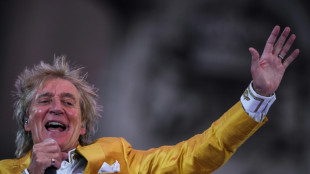
-
 Israeli security cabinet to discuss ceasefire as US says deal 'close'
Israeli security cabinet to discuss ceasefire as US says deal 'close'
-
COP29 president blames rich countries for 'imperfect' deal

-
 Stocks retreat, dollar mixed on Trump tariff warning
Stocks retreat, dollar mixed on Trump tariff warning
-
No regrets: Merkel looks back at refugee crisis, Russia ties

-
 IPL history-maker, 13, who 'came on Earth to play cricket'
IPL history-maker, 13, who 'came on Earth to play cricket'
-
Ukraine says Russia using landmines to carry out 'genocidal activities'

-
 Prosecutors seek up to 12-year terms for French rape trial defendants
Prosecutors seek up to 12-year terms for French rape trial defendants
-
'Record' drone barrage pummels Ukraine as missile tensions seethe

-
 Laos hostel staff detained after backpackers' deaths
Laos hostel staff detained after backpackers' deaths
-
Hong Kong LGBTQ advocate wins posthumous legal victory

-
 Ukraine says cannot meet landmine destruction pledge due to Russia invasion
Ukraine says cannot meet landmine destruction pledge due to Russia invasion
-
Rod Stewart to play Glastonbury legends slot

-
 Winter rains pile misery on war-torn Gaza's displaced
Winter rains pile misery on war-torn Gaza's displaced
-
'Taiwan also has baseball': jubilant fans celebrate historic win

-
 Russia pummels Ukraine with 'record' drone barrage
Russia pummels Ukraine with 'record' drone barrage
-
Paul Pogba blackmail trial set to open in Paris

-
 China's Huawei unveils 'milestone' smartphone with homegrown OS
China's Huawei unveils 'milestone' smartphone with homegrown OS
-
Landmine victims gather to protest US decision to supply Ukraine

-
 Indian rival royal factions clash outside palace
Indian rival royal factions clash outside palace
-
Equity markets retreat, dollar gains as Trump fires tariff warning

-
 Manga adaptation 'Drops of God' nets International Emmy Award
Manga adaptation 'Drops of God' nets International Emmy Award
-
China's Huawei launches 'milestone' smartphone with homegrown OS

-
 Philippine VP denies assassination plot against Marcos
Philippine VP denies assassination plot against Marcos
-
Four Pakistan security forces killed as ex-PM Khan supporters flood capital

-
 Hong Kong's legal battles over LGBTQ rights: key dates
Hong Kong's legal battles over LGBTQ rights: key dates
-
US lawmakers warn Hong Kong becoming financial crime hub

-
 Compressed natural gas vehicles gain slow momentum in Nigeria
Compressed natural gas vehicles gain slow momentum in Nigeria
-
As Arctic climate warms, even Santa runs short of snow

-
 Plastic pollution talks: the key sticking points
Plastic pollution talks: the key sticking points
-
Indonesia rejects Apple's $100 million investment offer

-
 Pakistan police fire tear gas, rubber bullets at ex-PM Khan supporters
Pakistan police fire tear gas, rubber bullets at ex-PM Khan supporters
-
Ronaldo double takes Al Nassr to brink of AFC Champions League last 16

-
 Pakistan police fire tear gas, rubber bullets at pro-Khan supporters
Pakistan police fire tear gas, rubber bullets at pro-Khan supporters
-
Hong Kong same-sex couples win housing, inheritance rights

-
 Indonesia digs out as flooding, landslide death toll hits 20
Indonesia digs out as flooding, landslide death toll hits 20
-
Liverpool's old guard thriving despite uncertain futures

-
 Mbappe takes reins for Real Madrid in Liverpool clash
Mbappe takes reins for Real Madrid in Liverpool clash
-
As AI gets real, slow and steady wins the race

-
 China's Huawei to launch 'milestone' smartphone with homegrown OS
China's Huawei to launch 'milestone' smartphone with homegrown OS
-
Porzingis and Morant make triumphant NBA returns

-
 Hong Kong top court affirms housing, inheritance rights for same-sex couples
Hong Kong top court affirms housing, inheritance rights for same-sex couples
-
Philippines, China clashes trigger money-making disinformation

-
 Most Asian markets drop, dollar gains as Trump fires tariff warning
Most Asian markets drop, dollar gains as Trump fires tariff warning
-
England 'not quivering' ahead of New Zealand Test challenge

-
 Bethell to bat at three on England Test debut against New Zealand
Bethell to bat at three on England Test debut against New Zealand
-
Trump vows big tariffs on Mexico, Canada and China

-
 New Zealand and England to play for Crowe-Thorpe Trophy
New Zealand and England to play for Crowe-Thorpe Trophy
-
Scheffler, Schauffele and McIlroy up for PGA Player of the Year

-
 Trump to face less internal pushback in new term: ex-commerce chief
Trump to face less internal pushback in new term: ex-commerce chief
-
Extreme weather threatens Canada's hydropower future


EU agrees deal to tame internet 'Wild West'
The European Union early Saturday finalised new legislation to require Big Tech to remove harmful content, the bloc's latest move to rein in the world's online giants.
The Digital Services Act (DSA) -- the second part of a massive project to regulate tech companies -- aims to ensure tougher consequences for platforms and websites that host a long list of banned content ranging from hate speech to disinformation and child sexual abuse images.
EU officials and parliamentarians finally reached agreement at talks in Brussels early Saturday on the legislation, which has been in the works since 2020.
"Yes, we have a deal!," European Commissioner for the Internal Market Thierry Breton tweeted.
"With the DSA, the time of big online platforms behaving like they are 'too big to care' is coming to an end. A major milestone for EU citizens," said Breton, who has previously described the internet as the "Wild West".
"Today's agreement on DSA is historic," European Commission chief Ursula von der Leyen tweeted.
"Our new rules will protect users online, ensure freedom of expression and opportunities for businesses. What is illegal offline will effectively be illegal online in the EU."
The regulation is the companion to the Digital Markets Act (DMA), which targeted anti-competitive practices among tech behemoths such as Google and Facebook and was concluded in late March.
The legislation had faced lobbying from the tech companies and intense debate over the extent of freedom of speech.
Tech giants have been repeatedly called out for failing to police their platforms -- a New Zealand terrorist attack that was live-streamed on Facebook in 2019 caused global outrage, and the chaotic insurrection in the US last year was promoted online.
The dark side of the internet also includes e-commerce platforms filled with counterfeit or defective products.
- Obligations for large platforms -
The regulation will require platforms to swiftly remove illegal content as soon as they are aware of its existence. Social networks would have to suspend users who frequently breach the law.
The DSA will force e-commerce sites to verify the identity of suppliers before proposing their products.
While many of the DSA's stipulations cover all companies, it lays out special obligations for "very large platforms", defined as those with more than 45 million active users in the European Union.
The list of companies has not yet been released but will include giants such as Google, Apple, Facebook, Amazon and Microsoft, as well as Twitter and probably the likes of TikTok, Zalando and Booking.com.
These players will be obliged to assess the risks associated with the use of their services and remove illegal content.
They will also be required to be more transparent about their data and algorithms.
The European Commission will oversee yearly audits and be able to impose fines of up to six percent of their annual sales for repeated infringements.
Among the practices expected to be outlawed is the use of data on religion or political views for targeted advertising.
Former Facebook employee Frances Haugen caused a huge stir last year when she accused her former bosses of prioritising profits over the welfare of users.
She hailed in November the "enormous potential" of the European regulation project, which could become a "reference" for other countries, including the United States.
However, the European Consumer Organisation (BEUC) fears the text does not go far enough.
It wants a ban on all advertising based on the surveillance of internet users, and random checks on online vendors' products.
L.Dubois--BTB
